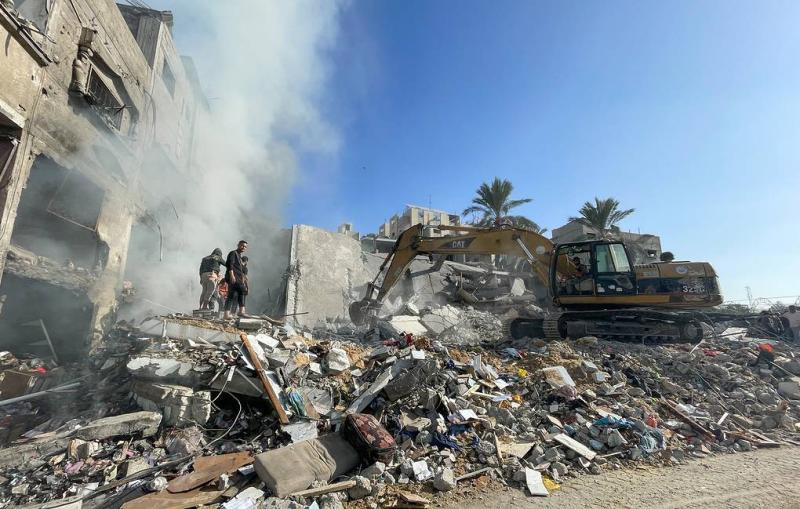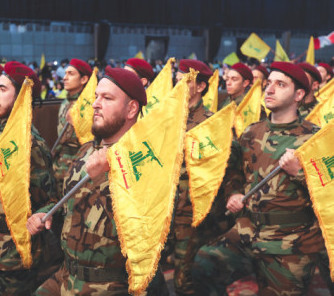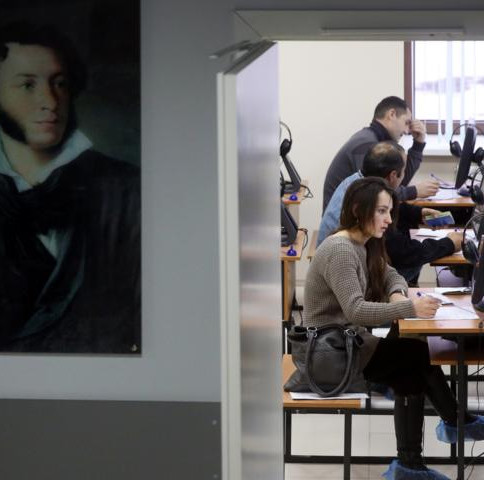
Israel and Hezbollah are teetering on the edge of an all-out war; India questions the value of the Russia-less Swiss conference on Ukraine; and NATO kicks off major military drills in the Baltic Sea. These stories topped Thursday’s newspaper headlines across Russia, according to TASS News Agency
Vedomosti: Israel, Hezbollah on brink of large-scale conflict
The Israeli army is ready to take powerful action in the country’s north in response to attacks by the Lebanon-based pro-Iranian group Hezbollah, Prime Minister Benjamin Netanyahu said. To this end, the Israeli government has announced plans to call up an additional 50,000 reservists, Vedomosti writes.
Following the draft, the Israeli army’s size may reach 350,000 people. According to the Times of Israel newspaper, since the start of military operations in the Gaza Strip in October 2023, the Defense Ministry has mobilized 287,000 people, a record number in the country’s recent history. Chief of the General Staff of the Israel Defense Forces Lieutenant General Herzi Halevi said earlier that the country would soon make a decision with regard to Hezbollah’s "daily attacks" on Israel.
The likelihood of a full-scale Israeli ground operation against Hezbollah in Lebanon has increased, Russian International Affairs Council expert Kirill Semenov pointed out. In his view, the current Israeli war cabinet is looking to escalate tensions in order to shift the focus of attention from Gaza to the north and allow Netanyahu to remain in power. A potential operation is also in the Israeli military’s interests. "For the military, Hezbollah is like a Sword of Damocles over Israel. The army fears that a devastating attack may come from Lebanese soil if the Gaza war drags on. So the military is looking for an opportunity to carry out a preventive strike on militants in Lebanon, in spite of the risks," the expert explained.
According to Semenov, in case of a hypothetical invasion, the Israeli army will seek to clear southern Lebanon of Hezbollah. However, in the expert’s words, just like in Gaza, the Israeli army will get bogged down once in Lebanon.
The Israeli authorities are probably trying to use the threat of an escalation in order to put pressure on Iran so that it persuades Hezbollah to ease pressure on Israel, Dmitry Maryasis, editor-in-chief of the Middle East Economy magazine, said. Since the war started, Tehran has made it clear that it does not want a rise of tensions in the region, especially now, with the country's presidential election on the horizon, the expert added.
Izvestia: India questions value of Russia-less Swiss conference on Ukraine
New Delhi will support a peace plan on Ukraine only if both parties to the conflict approve it, Indian Ambassador to Russia Vinay Kumar told Izvestia. He emphasized that India does not believe that the upcoming conference on Ukraine in Switzerland will produce results without Russia. India has not yet made a decision concerning its participation in the event due to the recent general election in the country.
India continues to maintain a balanced position. It has never criticized Russia for its special military operation and it will not support any initiatives that call for a complete withdrawal of Russian troops or the creation of a tribunal to prosecute Russia, Rakesh Bhadauria, head of the Center for Strategic Studies and Simulation at the United Service Institution of India, told the newspaper. According to him, the Indian Foreign Ministry has a dialogue with both parties; New Delhi feels that it can encourage them to engage in talks, the expert stressed.
In a situation where one of the parties to the conflict will be absent from the conference, the meeting will be almost meaningless. Suffice to say that US President Joe Biden has no plans to travel to Switzerland. As for the countries of the Global South, China has refused to send delegates to the meeting. The leaders of Brazil and South Africa will also be absent. Media reports say that Saudi Arabia has also decided against taking part in the conference.
"The fact that the leaders of the countries of the Global South won’t be present at the meeting is definitely a loss for Ukraine and the organizers. It’s the participation of top officials from China, South Africa, Brazil and other nations that the West needed to legitimize the meetings in Burgenstock. However, the West initially was not interested in hearing them out, as their position is not about inflicting a defeat in Russia on the battlefield but about resolving the conflict," Denis Denisov, an expert at the Financial University under the Government of the Russian Federation, noted.
According to him, the West realizes that it’s impossible to adopt a document that members of the "non-Western camp" would back. The likelihood is growing that after the Burgenstock event, another meeting on resolving the Ukrainian conflict may be organized, which will involve Russia. Instead of Switzerland, a country that is neutral in the conflict will host the meeting.
Rossiyskaya Gazeta: NATO kicks off major military drills in Baltic Sea
NATO’s 53rd annual BALTOPS exercise has kicked off in the Baltic Sea. This year, the drills involve 50 ships, 80 planes and helicopters, and about 9,000 troops from 20 NATO countries. Sweden and Finland will take part in the exercise for the first time since becoming members of the organization. In addition, also a first, the naval forces assigned to the US Indo-Pacific Command will participate in the European maneuvers, Rossiyskaya Gazeta writes.
The drills are said to be aimed at demonstrating strategic cooperation between NATO allies. BALTOPS comes immediately after an even larger-scale exercise, Steadfast Defender 2024, which involved a total of over 90,000 troops from 32 NATO countries.
Interestingly, the BALTOPS drills are organized by the US, a country from outside the Baltic Sea region. However, it is the US that has been holding and sponsoring these military drills since their inception in 1972. Initially, the idea was to show the US Navy’s ability to take action near Soviet borders. After 1993, the focus of the maneuvers shifted to strengthening NATO’s ties with the countries that used to be part of the Soviet Union or in its sphere of influence. Later, all these countries joined the North Atlantic Alliance. Meanwhile, according to US investigative reporter Seymour Hersh, the drills were used as a cover to plant explosive devices under the Nord Stream gas pipelines in 2022.
Colonel Levon Arzanov, a presidium member of the nationwide public organization "Officers of Russia," believes that "the only goal of current NATO drills is to show Russia that if it secures more victories in Ukraine, NATO may join the war." "Notably, NATO is indeed gathering troops near our borders. We, in turn, are conducting our own drills. We will not be intimidated by such maneuvers," the expert added.
Nezavisimaya Gazeta: European Parliament may see right-wing shift
June 6 saw the start of elections to the European Parliament, the European Union’s highest legislative body. The vote will last four days across each of its 27 EU member states. The elections will provide an answer to the question of whether right-wing forces and Eurosceptics will be able to significantly strengthen their positions, as opinion polls forecast. It’s hard to say where they will fall in the conflict between Russia and Ukraine because they don’t have a unified position, Nezavisimaya Gazeta writes.
Up for grabs are 720 seats in one of the European Union’s three main government institutions and the only one that European citizens elect through direct vote. The two others are the European Council and the European Commission. The first one brings together the heads of state and ministers from EU nations. This is where the most important decisions are made, including those related to sanctions on Russia. That said, even if the European Parliament is made up only of those opposing assistance to Ukraine (which is unlikely), the EU’s policy towards Russia will hardly see radical changes.
Judging by the polls, right-wing populists and far-right members of the pan-European groups European Conservatives and Reformists and Identity and Democracy are expected to significantly increase their presence. They currently hold 18% of mandates but forecasts say they may receive 21% to 24% of the vote in the current elections.
"Hypothetically, if a new big faction emerges, it will include forces that are both positive and negative towards Russia. It remains to be seen how consolidated they will be when voting on Russia-related issues," Alexander Tevdoy-Burmuli, associate professor with the Integration Processes Department at Moscow State Institute of International Relations, pointed out. Besides, the expert notes that the European Parliament initially has little power in terms of foreign policy. "If the two parties do come in second - which I doubt will happen - the rhetoric of European Parliament members will probably change. It will be less tough and critical towards Russia. However, I don’t think that serious changes should be expected," the analyst said.
Vedomosti: Record growth in green energy generation not enough to meet climate goals
Renewable energy generation saw a huge uptick in 2024, increasing by 64% compared to the previous year, Vedomosti writes, citing a report by the International Energy Agency (IEA).
However, according to the IEA, even the record rise recorded last year will not be enough to achieve the goals set at the COP28 United Nations Climate Change Conference at the end of last year, when 117 countries pledged to triple global renewable energy production by 2030 in order to decarbonize the energy sector.
As far as Russia is concerned, apart from hydropower projects, the country also has the capacity to develop wind and solar power generation, Matvey Taits, senior analyst at Sinara investment bank, noted. According to him, it’s profitable to build wind and solar power plants in the country’s southern and coastal regions.
Energy expert Kirill Rodionov points out that the construction costs of wind and solar power plants have significantly dropped in recent years. The use of high-capacity installations is one of the reasons.
It’s far more difficult to develop other renewable sources of power, Yelena Pastukhova, project manager for the ESG practice at Strategy Partners, emphasized. Areas suitable for geothermal energy sites are sometimes hard to reach, while construction work requires major investment and complicated equipment, she explained.
Taits stresses that building the renewable energy base in Russia will depend on government support, as well as on efforts to cooperate with private investors and international partners, develop production facilities for renewable energy equipment and upgrade energy infrastructure.
TASS is not responsible for the material quoted in these press reviews









